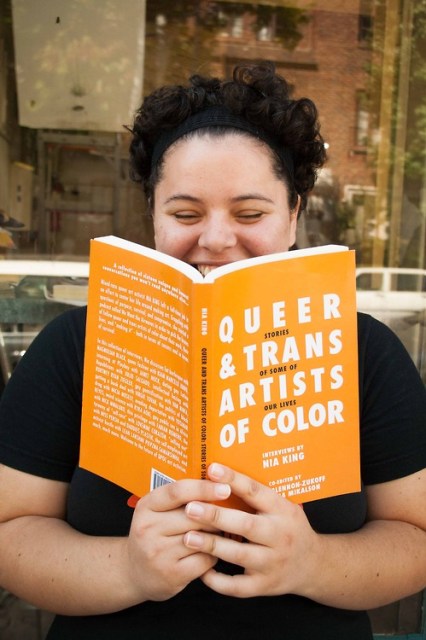Queer And Trans Artists of Color: Stories of Some of Our Lives is a collection of interviews that author, artist, activist and podcaster Nia King has done with QTPOC artists (Nia notes in the book that QTPOC is pronounced “QT” like “cutie” and “‘POC’ as in Tupac.”) through her podcast, which you can find at her website. She had initially had the podcast interviews transcribed to make them accessible to deaf and hard-of-hearing people, but it was soon edited into this wonderful and vitally important book.
It features interviews with artists including LAMBDA Award-nominated author and educator Ryka Aoki; artist and Trauma Queen author Lovemme Corazón (also known as Luna Merbruja); storyteller, performer and dancer Magnoliah Black; author, activist and fat discrimination and body image expert Virgie Tovar; writer, performer and organizer Leah Lakshmi Piepzna-Samarasinha; and author and activist Janet Mock. In the book, King says that she wanted to make sure that each of these artists was not soon forgotten.
I wanted to create this book so that the work of these amazing artists who have influenced me will not seem like a flash in the pan if they eventually burn out or go broke and have to stop creating. I want there to be a record of their wisdom and their influence and their greatness that will inspire others to create as well. I really do believe that QTPOC art activism saves lives, and this book is just one of my many efforts to show how and why.
The voices and experiences of queer and trans people of color (especially queer and trans women of color) are so often erased, silenced or pushed to the background. When our stories are told, they are told by people outside the community who don’t always tell the story the way it really happened. This book proudly stands in direct defiance of these traditions. I don’t think I can put it any better than Toi Scott does in the introduction where they write “Nia King has passionately sought to archive the experiences of queer and trans people of color who are committed to art as a tool for political change. Her work with QTPOC artists on her podcast ‘We Want the Airwaves’ is an important and innovative contribution to the oral history record, not just for queer and trans people of color, but for everyone.”

It’s really captivating to hear how all of these artists deal with the intersectionalities of their identities while trying to navigate the art world. From Aoki talking about having to deal with when men in the publishing world to Tovar discussing the opposition she faced as a graduate student to Yosimar Reyes trying to travel to perform while being undocumented and Luna Merbruja talking about using communal care to thrive as a trans woman of color and survivor of abuse.
This is vitally valuable information. These QTPOC are making important art and are changing their communities and the world through their art and activism, and here we have them giving advice and wise words and tips for how to work as a QTPOC artist. This is simultaneously one of the most informative and inspirational books I’ve read in a long time.It’s like a primer for how to be an effective artist or community worker. But the advice isn’t just for potential artists. Some of the interviewees, like Tovar, give advice on how to best support queer and trans artists of color.
When we don’t pay artists, we sentence ourselves to a life where there won’t be art by people of color, by queers, by women, and we know that it’s struggle and critique and understanding and resilience that creates fantastic art. When the people who are experiencing those things aren’t creating work, we lose things as a culture. We lose things as a species.
There are several ways to purchase this book. You can contact King via Paypal or order it online at Amazon, or if you’d like to buy it in person, it’s available in Pegasus Books in Oakland and downtown Berkeley, Show and Tell Concept Shop in Oakland, Quimby’s in Chicago and Bluestockings in New York City.
We know the world is a dangerous place for trans women of color, and for all queer people of color. We know that there are so many ways that society tries to silence their voices. And that’s one of the reasons this book is so important. We also know that when you’re trying to succeed in art or activism, you can use all the help and advice you can get. If you’re looking to change the world, just listen to the words of these artists of color, after all, they’re already doing just that.







